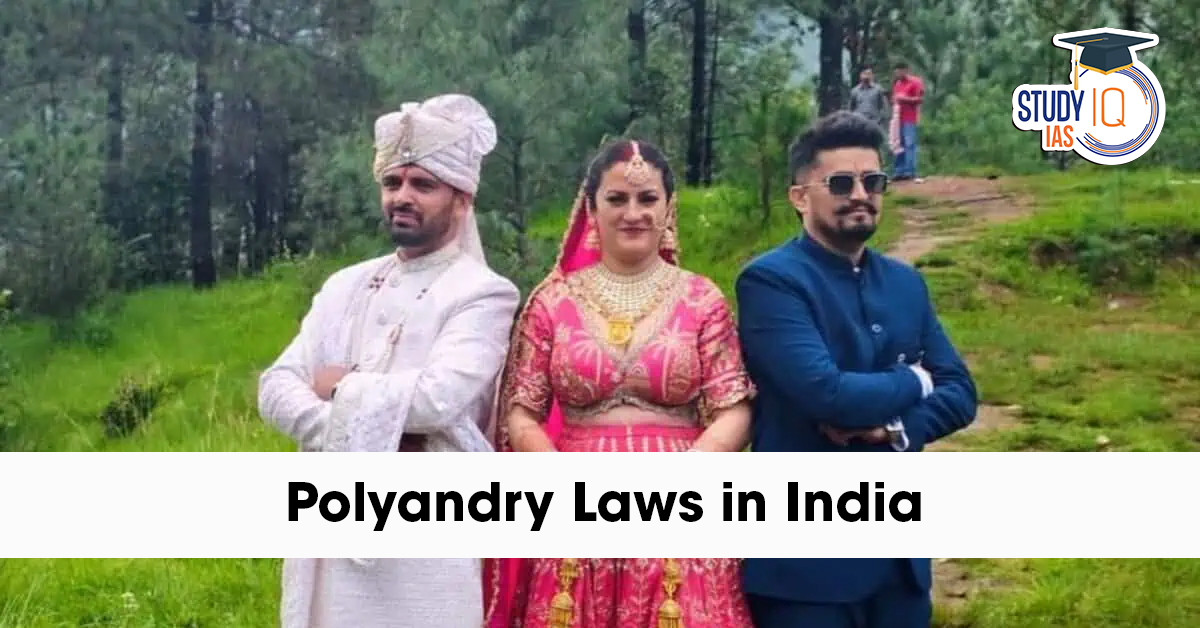Table of Contents
Context: A woman from Himachal Pradesh who belongs to Hatti tribe married two brothers. This form of polyandry is locally known as ‘Jodidaran’.
| Jodidaran in Hatti Tribe |
Related Fact
|
Legal Status of Polyandry and Polygamy in India
- Polyandry (a woman marrying multiple men) is not legally recognised and not protected under any Indian law.
- Polygamy (a man marrying multiple women) is:
- Prohibited for Hindus, Sikhs, Buddhists, and Jains under the Hindu Marriage Act, 1955.
- Outlawed under the Special Marriage Act, 1954, which governs civil marriages across all communities.
- Criminalised under the Bharatiya Nyaya Sanhita (BNS), 2023, which replaced the IPC.
Customary Laws and Scheduled Tribes (STs)
Article 342 of the Constitution empowers the President to declare certain communities as Scheduled Tribes (STs), which entitles them to special legal protections.
- Section 2(2) of the Hindu Marriage Act explicitly states that it does not apply to members of STs unless the Central Government directs otherwise through a notification.
- Thus, uncodified customary practices, like polyandry among the Hatti tribe, may continue in the absence of a conflicting government notification.
Conditions for Validity of Customary Practices
As per Section 3(a) of the Hindu Marriage Act, a “custom” must:
- Be long-standing and unbroken in usage;
- Be certain, reasonable, and not opposed to public policy;
- Be proven in court with credible evidence if challenged.
Uniform Civil Code (UCC) and Customary Exemptions
- Uttarakhand’s UCC (2024–2025) prohibits polygamy and mandates equal rights in marriage, divorce, and adoption.
- However, STs are exempt under Section 2 of the UCC Rules, continuing the constitutional tradition of respecting tribal customs.
Judicial Stance on Customary Practices vs Fundamental Rights
Courts have increasingly prioritised Fundamental Rights over regressive customs, especially when customs are arbitrary, discriminatory, or inconsistent with Articles 14, 15, and 21 of the Constitution
Relevant Supreme Court Judgments
- Shayara Bano v. Union of India (2017)
- Triple talaq was struck down as unconstitutional despite being a custom under Muslim Personal Law.
- The court ruled it violated Articles 14 & 21 (Right to equality and dignity).
- Indian Young Lawyers Association v. State of Kerala (Sabarimala Case, 2018)
- Exclusion of menstruating women from the Sabarimala Temple was held unconstitutional.
- The court held that customs cannot override equality and dignity.
- Ram Charan & Ors. vs Sukhram & Ors. (2024)
- Related to the inheritance rights of tribal women.
- The SC ruled that even if customs are silent or male-preferential, women cannot be denied their rights.
- Reaffirmed: “Customs cannot remain stuck in time”.


 Particularly Vulnerable Tribal Groups (P...
Particularly Vulnerable Tribal Groups (P...
 Geo-tagging of Buildings During Upcoming...
Geo-tagging of Buildings During Upcoming...
 Gender Gap in Educational Expenditure in...
Gender Gap in Educational Expenditure in...




















